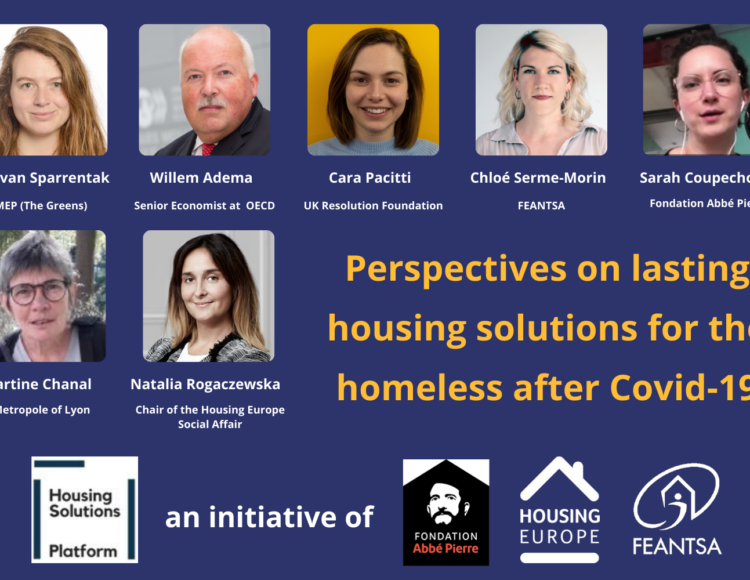The Housing Solutions Platform, run by Housing Europe, FEANTSA and Abbe Pierre, hosted a debate to discuss existent and necessary future housing solutions for the homeless once the ongoing global health pandemic will be behind our backs. The event took place online on 29th January and brought together a diverse panel of speakers, including Housing Europe’s Social Affairs Committee Chair, Natalia Rogaczewska.
MEP Kim van Sparrentak from the Green party of the European Parliament whose report “Access to adequate and affordable housing” was adopted this January stressed that the health crisis should not only get policymakers and the society bogged down into the day-to-day struggles, but that we should also try to remain focused on what we want to achieve. “People flourish not when you squeeze them,” she said and added that affordable housing interlinked with the building of housing is the way to prevent homelessness, with the help of healthy social security and social inclusion.
Willem Adema, a senior economist at the OECD, shared housing markets trends clearly demonstrating that while being a fundamental human right, housing has been taking an incredibly large amount of households’ monthly budget in comparison to other basic needs, such as health, education or transport. At the same time, public investment in housing has been decreasing. He mentioned that many governments introduced temporary emergency housing support in response to Covid-19. The most common measures have been to ask owners to tolerate delayed payments of mortgages and to prevent tenants’ eviction.
Moving on to the United Kingdom, Cara Pacitti, from the UK Resolution Foundation shed some light on the blurry future impact of this crisis on incomes and the job market. Pacitti highlighted that the statistics from February – just a month before COVID-19 hit Europe – until September 2020, shows that the largest group of people who lost their jobs has been the one with people who were already relying on low incomes. Within this group, 13% no longer work, 11% got partially or fully furlough and 6% lost hours and pay. However, based on the government support scheme, this group of vulnerable people have still received 80% of their wages. Chloé Serme-Morin (FEANTSA) and Sarah Coupechoux (Fondation Abbé Pierre) walked the audience through the fifth overview of the 2020 “Housing exclusion report in Europe”. While accurate numbers depicting the impact of the pandemic on homelessness are still missing, they both underlined that Covid has inevitably magnified the housing crisis and increased housing inequalities with a widening housing costs’ gap between poor and wealthier households. In the last 10 years for example the total housing costs have risen by 21% for low-income tenants in the EU.
In France, Martine Chanal from the metropole of Lyon explained that the housing situation in the city has been tense even before the pandemic which has provoked an urgent call for policy action. As a result, the city has come up with an ambitious plan that will aim at bringing homelessness levels down drastically. The “zero return to the street” plan has started with the urgent increase of temporary urban solutions, the mobilisation of the private housing stock and support to households. It is notable to mention that in pre-Covid circumstances, there were 70,000 ongoing requests for social housing, 9,000 new allocation of social housing each year and 5,000 social housing units built annually. In 2020, however, COVID restrictions and health risks have limited construction work and the built or renovated social housing stock has decreased.
The most important ability during the COVID-19 crisis is to keep and maintain a long-term focus, Housing Europe’s Social Affairs Chair, Natalia Rogaczewska stressed. She went onto saying that joining efforts on homelessness can provide a vision for long-term social investments in an integrated urban development agenda and creating a new kind of competitiveness. “Investing in the right areas will create better societies, better lives and better economies which all will create more wealth for all,” Natalia added. To her, Covid-19 has magnified already existing inequalities in our societies and has made the fight against homelessness not only more challenging but also more relevant and said that “this is a wake-up call for citizens and also for political systems.”
While many social housing associations now have solid experience with support programmes for the homeless, such as “Housing first”, Natalia Rogaczewska insisted also on the need for prevention. Delivering decent, social and affordable housing to people on a tight budget has proved to be one of the best ways to drastically reduce levels of homelessness. Natalia also shared how good policy and systematic approach can work in practice. The third largest city in Denmark, Odense has reduced homelessness by 40% during the last 10 years. Nearly 500 citizens have obtained their own housing in these 10 years, and 87% have kept their places. Close cooperation between the housing organisations and the municipality has been essential to achieve the results.
In conclusion, our Chair said that 2021 can be a watershed moment for battling homelessness in the EU. MEP Kim van Sparrentak’s resolution has just been adopted, the Action Plan on the Pillar of Social Rights is underway, with the general escape clause in the Stability and Growth Pact, and most importantly taking advantage of the momentum we are witnessing can bring the change in homes many have been looking for too long.
For more information, you can watch the debate HERE
Visit the Platform
